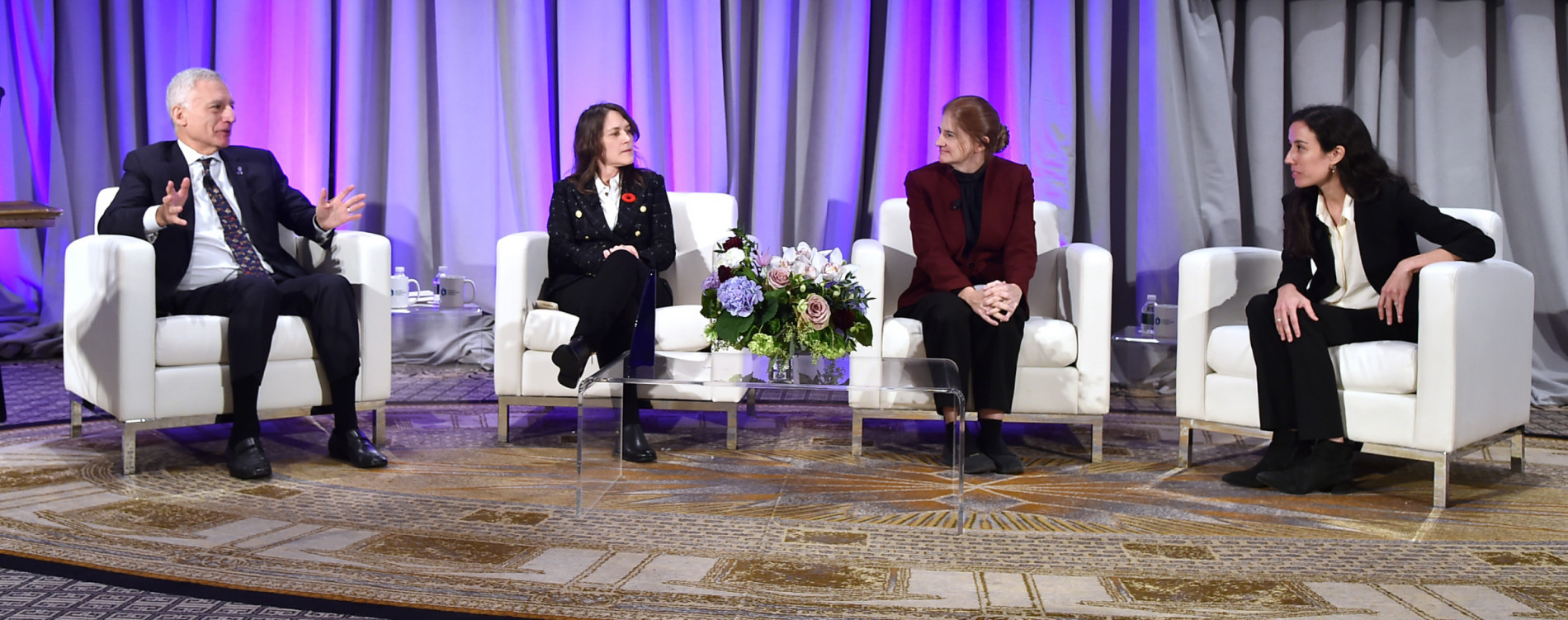On November 1, it was my great pleasure to preside over the Alzheimer's Drug Discovery Foundation's (ADDF) Annual Fall “Hope on the Horizon” Symposium in New York City. A panel of highly esteemed scientists dedicated to Alzheimer’s research assembled for the event. This year we were privileged to have three out-of-the-box thinkers discuss their exciting work in a promising area—the repurposing of FDA-approved drugs used to treat other conditions for use in Alzheimer’s disease. The panelists were:
- Krista L. Lanctôt, PhD, Senior Scientist in Geriatric Psychiatry; Head of Neuropsychopharmacology Research at the Hurvitz Brain Sciences Program at Sunnybrook Research Institute; Professor of Psychiatry and Pharmacology/Toxicology at the University of Toronto
- Dawn Matthews, MS, MBA, Chief Executive Officer of ADM Diagnostics
- Ana C. Pereira, MD, a cognitive neurologist and neuroscientist at the Icahn School of Medicine at New York City’s Mount Sinai Hospital
THE BENEFITS OF REPURPOSING
Repurposing currently represents an important part of the ADDF’s drug development strategy. We are currently supporting the testing of 16 drugs for repurposing. Given the incredibly high costs—and long timeframes—associated with drug trials, any means of accelerating the process is welcomed.
And while brand new treatments need to start with animal testing and proceed through all required FDA clinical trial phases, repurposed agents have already been proven safe for use in humans, allowing for a shorter and less costly research process.
Testing a Chemo-Therapy Agent for Alzheimer’s Agitation: Krista L. Lanctôt, PhD
Many patients with Alzheimer’s disease experience severe agitation, which involves restlessness, general emotional distress, verbal or physical outbursts and aggression. The agitation and distress exhibited by so many patients with moderate-to-severe Alzheimer’s can contribute to decreased quality-of-life for patients and caregivers and is one of the main reasons so many end up in nursing homes. While about 20 percent of people with Alzheimer’s experience agitation, this symptom remains a challenge to treat. Antipsychotics have shown only limited efficacy and can come with serious safety warnings.
Dr. Lanctôt discussed her research into the possible use of nabilone, a cannabinoid already approved for the treatment of nausea and vomiting in chemotherapy, to combat agitation in Alzheimer’s patients. She revealed that in her recent randomized double-blind crossover trial comparing nabilone to placebo in patients with moderate-to-severe Alzheimer’s disease, nabilone had a positive effect on agitation and demonstrated neuroprotective and anti-inflammatory benefits. “In advanced Alzheimer’s disease, neurons are killed by over-activation, and this drug may protect from this, as well as help with neuroinflammation,” Dr. Lanctôt stated.
Dr. Lanctôt noted support from the ADDF for her research, including now a Phase 3 trial. Cognition and sedation will need to be monitored, but if nabilone proves to be safe and effective in this additional research, I believe this drug could potentially be a game-changer in improving quality-of-life for Alzheimer’s patients and caregivers.
Addressing Alzheimer’s with a Parkinson’s Drug: Dawn Matthews, MS, MBA
Based on the observation that a drug called rasagiline was positively impacting cognition as it improved motor deficits in Parkinson’s disease patients, researchers are now exploring use of this agent in Alzheimer’s disease patients with mild-to-moderate cognitive impairment.
Ms. Matthews discussed the results of a Phase 2 trial of rasagiline in Alzheimer’s patients, conducted by Jeffrey Cummings, MD, ScD of the Cleveland Clinic, recipient of the 2019 Melvin R. Goodes Prize. In the Alzheimer’s brain, various changes occur, including shifts in the brain’s use of glucose, and an increase in tau protein tangles. Ms. Matthews explained that Dr. Cummings used various forms of PET brain imaging as biomarkers to determine whether patients treated with rasagiline had changes in their brain’s glucose metabolism or exhibited reduced tau levels. She revealed that preliminary imaging data yielded exciting results regarding rasagiline’s efficacy, adding that, “patients treated with rasagiline [also] did better on quality-of-life and executive functioning.” These favorable results provided the green light to proceed with a larger trial. The ADDF has long-supported her work in developing better imaging technology and analytics, and is proud to have contributed to the advances in metabolic brain and tau imaging necessary for this landmark research—the first use of tau imaging to show benefits of an Alzheimer’s agent.
Borrowing from the ALS Drug Arsenal: Ana Pereira, MD
Since ALS, also known as Lou Gehrig’s disease, exhibits similar neurodegenerative characteristics to Alzheimer’s, Dr. Pereira is studying the possible use of riluzole, a clinically approved drug for ALS, in Alzheimer’s patients. To date, riluzole is the only drug that has been shown to slow the course of ALS.
Riluzole works to control the age-related build-up of a neurotransmitter called glutamate. Dr. Pereira explained how a glutamate accumulation in the brain can affect synapses and accelerate age-related cognitive decline. Riluzole has already been shown to prevent age-related cognitive decline in mice and rats.
Dr. Pereira said that she made the choice to focus on Alzheimer’s disease because of how it “robs people of their identity.” She believes her work “could not have been done without ADDF,” which has supported her work including funding to cover the costs of a clinical trial in patients with moderate Alzheimer’s disease. Currently underway at Mount Sinai Hospital in New York City, this trial uses both neuro-imaging and neuro-psychological testing to determine drug efficacy. “We are using biological tools to identify key drivers of Alzheimer’ disease to more effectively target it,” Dr. Pereira explains. She—and we—are currently awaiting results, with the hopes that this promising new treatment can be added to the Alzheimer’s disease arsenal.
The ADDF is proud to support the work of each of these scientists, who are at the forefront of taking the field in new directions, and hopefully bringing safe and effective drug treatment options to patients.
Howard Fillit, MD is the Founding Executive Director and Chief Science Officer at the ADDF.
Howard Fillit, MD is the Founding Executive Director and Chief Science Officer at the ADDF.
